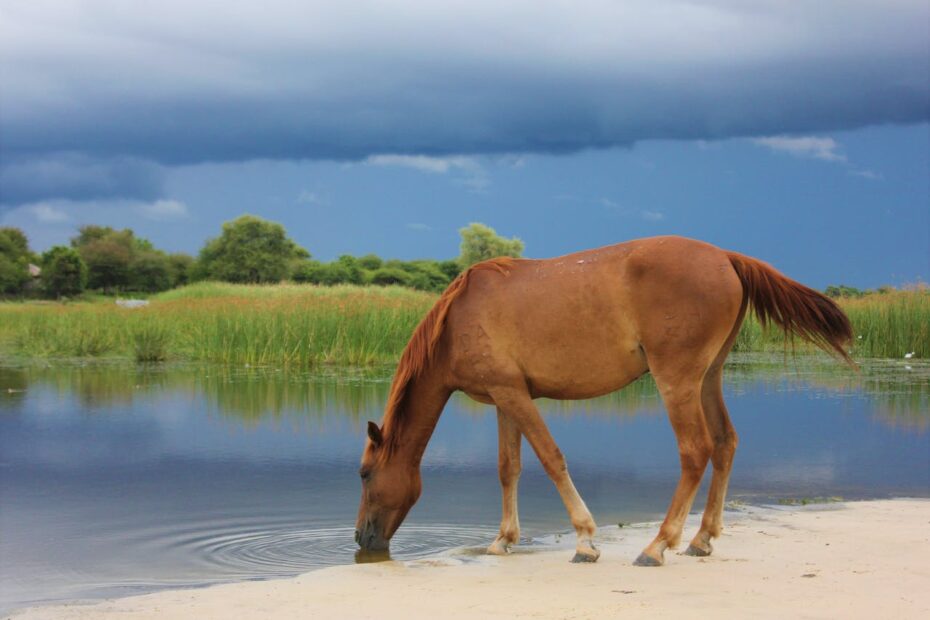When it comes to maintaining the health and vigor of our equine companions, understanding the nuances of their wellbeing is crucial. One such nuance that often gallops under the radar is dehydration. Despite being a common issue, dehydration in horses can trot from mild to life-threatening in no time. As caretakers of these noble creatures, recognizing the red flags of dehydration is as vital as ensuring they have a trough of fresh water. In this article, we will canter through the 10 definitive signs of dehydration in horses, so you can keep your hoofed friend healthy, happy, and hydrated.
Signs of Dehydration in Horses
1. Decreased Skin Elasticity (Skin Tent Test)
The first sign is often found right under our fingertips. Gently pinch and lift the skin on your horse’s neck or shoulder. In a hydrated horse, the skin should snap back instantly. However, if it retains a ‘tented’ shape, it’s a classic distress signal for dehydration.
2. Dry or Sticky Gums
Healthy horse gums are slick and moist, much like our own. When dehydration begins to whinny through their system, gums may feel dry or tacky. A quick check can provide immediate insight into your horse’s hydration status.
3. Lethargy or Depression
A horse with zest is a sight to behold, but when dehydration hits, their vigor may diminish. If your typically spirited mare or stallion seems unusually lethargic or appears depressed, it’s time to assess their water intake.
4. Dark or Decreased Urine Output
Keep an eye on their urine. Dark, concentrated urine or a noticeable decrease in urination can be indicative of insufficient water in the system. Remember, normal horse urine can vary from pale yellow to deep amber, but it should never be as dark as apple cider.
5. Elevated Heart Rate
An elevated heart rate can indicate various health issues, but coupled with other signs, it points to dehydration. If your horse’s heart is racing faster than its hooves, and rest doesn’t ease the pace, it’s a red flag waving for attention.
6. Sunken Eyes
The eyes are not only the window to the soul but also to hydration. Sunken eyes, lacking their usual bright and alert appearance, can signal that your horse’s fluid levels are dropping dangerously low.
7. Prolonged Capillary Refill Time
Press on your horse’s gum and release; the color should return within 1-2 seconds in a well-hydrated horse. If it takes longer, this indicates that the circulatory system may be struggling due to low fluid volume.
8. Poor Performance or Endurance
If your horse’s performance is waning or they tire easily during exercises they normally handle with ease, it may not just be an off day. Dehydration can significantly impact their stamina and strength.
9. Reduced or Absent Gut Sounds
Gut sounds, or borborygmi, are signs of digestive health and activity. These can be assessed with a stethoscope or even by ear. A reduction or absence of these sounds can mean that dehydration is affecting digestive function.
10. Weight Loss
Although weight loss can be symptomatic of various conditions, a sudden drop in weight without a change in diet or workload could be due to dehydration, as a significant amount of a horse’s body weight is attributed to water.
Quick Tips for Treating a Dehydrated Horse
If you suspect you need to employ horse dehydration treatment, here are a few immediate actions to take:
- Provide Water: Offer your horse small amounts of lukewarm water to drink every 15-20 minutes.
- Electrolytes: Administer a balanced electrolyte supplement to replace lost minerals.
- Shade and Rest: Move your horse to a shaded area and allow them to rest, avoiding any strenuous activity.
- Monitor Vital Signs: Keep a close watch on their heart rate, gum color, and capillary refill time.
For more in-depth guidance on nursing your horse back to optimal hydration levels, delve into our detailed article: “How to Treat a Dehydrated Horse”. There, we unpack the full suite of strategies to effectively manage and prevent dehydration in horses, ensuring your equine friend’s health and happiness.
Keep Tabs on your Horses Hydration
Recognizing these red flags can make all the difference in the paddock of prevention. Dehydration in horses can trot from a parched patch to a critical condition swiftly. By keeping a vigilant eye on these signs, providing constant access to clean water, and ensuring your horse maintains a balanced diet with adequate electrolytes, you can steer clear of dehydration’s grip.
Remember, the best trough for these magnificent beasts is one filled with both care and water. If your equine friend is exhibiting any combination of these symptoms, it’s prudent to consult with your veterinarian promptly. By being proactive in recognizing the signs of dehydration, you’re not just a horse owner; you’re a horse protector.
Keep trotting towards health and hydration, and may your horse always have the vivacity of a well-watered rose in the sunlit fields.
